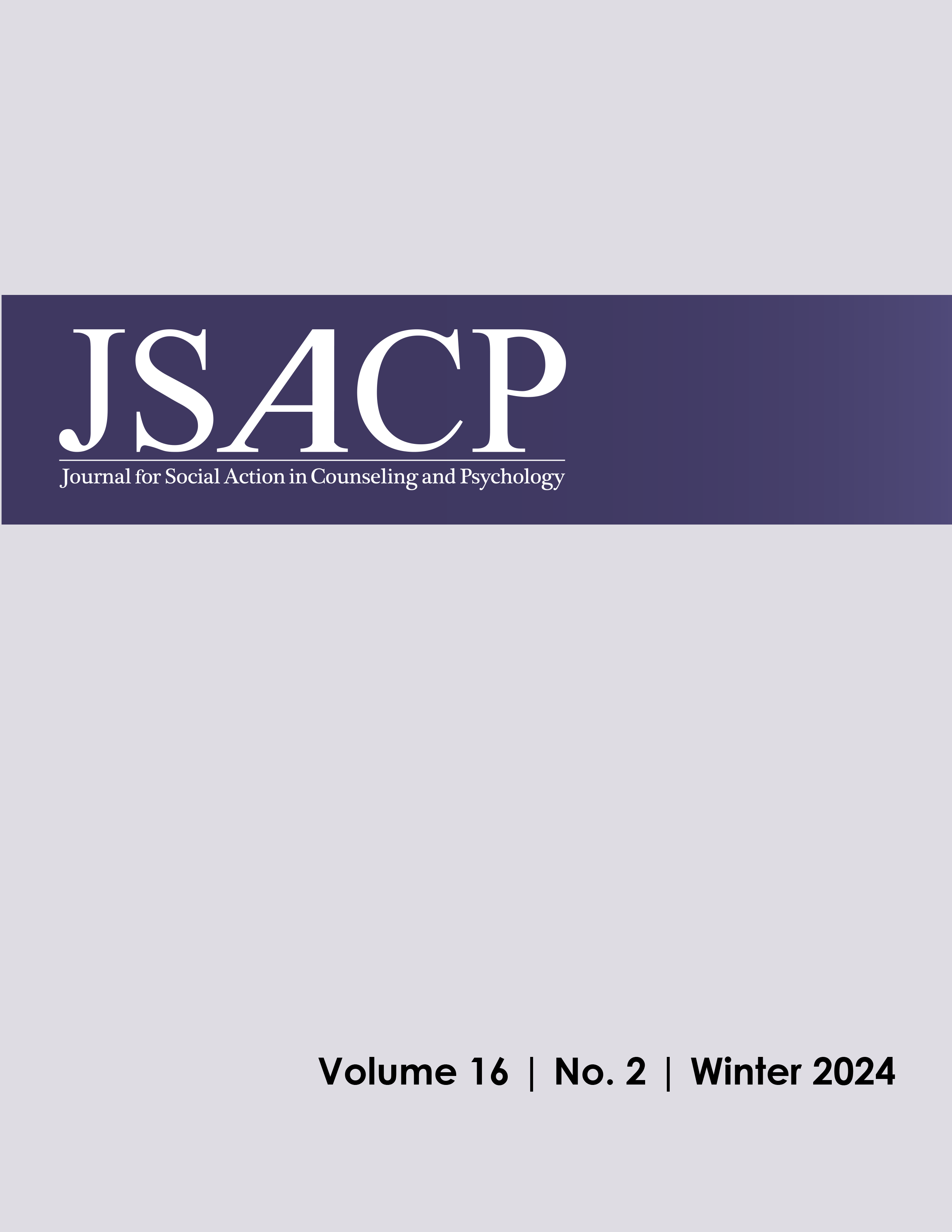Challenging Mental Health Professionals to Look Beyond the Consulting Room
A Review of Becoming a Citizen Therapist: Integrating Community Problem-Solving into Your Role as a Healer
DOI:
https://doi.org/10.33043/4a6a157364Keywords:
Advocacy, Social justice, Promoting Equity, Macrosystem Interventions, Community OrganizersAbstract
William Doherty and Tai Mendenhall's work on the "Citizen Therapist" model bridges psychotherapy with social engagement, emphasizing the interplay between mental health and societal factors. Their book critiques hyper-individualism in therapy, advocating for therapists to address systemic issues such as political polarization, racism, and culturally sensitive healthcare. In addition to outlining the rationale and practical guidelines for mental health professionals to collaborate with their fellow citizens, the book provides examples of programs aimed at addressing community conflicts, promoting healthy lifestyles, and enhancing family life. The model emphasizes community-driven solutions while maintaining professional boundaries, highlighting the connection between individual well-being and societal health.
Downloads
References
Baron, H., Blair, R., Choi, D. D., Gamboa, L., Gottlieb, J., Robinson, A. L., & West, E. A. (2021). Can Americans depolarize? Assessing the effects of reciprocal group reflection on partisan polarization. Preprint at OSF. https://doi.org/10.31219/osf.io/3x7z8
Bellah, R. N., Madsen, R., Sullivan, W. M., Swidler, A., & Tipton, S. M. (2007). Habits of the heart, with a new preface: Individualism and commitment in American life. University of California Press.
Boursaw, B., Oetzel, J. G., Dickson, E., Thein, T. S., Sanchez‐Youngman, S., Peña, J., & Wallerstein, N. (2021). Scales of practices and outcomes for community‐engaged research. American Journal of Community Psychology, 67(3-4), 256-270. https://doi.org/10.1002/ajcp.12499
Centers for Disease Control. (2024). Improving Health in Indian Country. Retrieved from https://www.cdc.gov/diabetes/health-equity/health-american-indian.html
Chappell, B. (2020). Pope Francis decries “The sin of racism.” (June 3). National Public Radio.
Compton, W. C., & Hoffman, E. (2019). Positive psychology: The science of happiness and flourishing. Sage Publications.
Das, K. V., Jones-Harrell, C., Fan, Y., Ramaswami, A., Orlove, B., & Botchwey, N. (2020). Understanding subjective well-being: Perspectives from psychology and public health. Public Health Reviews, 41, 1-32. https://doi.org/10.1186/s40985-020-00142-5
De Tocqueville, A. (1899). Democracy in America: Volume II.D. Appleton.
Doherty, W. J. (2002). How therapists harm marriages and what we can do about it. Journal of Couple and Relationship Therapy, 1(2), 1-17. https://doi.org/10.1300/J398v01n02_01ooks.
Doherty, W. (2017a). Bill Doherty on becoming a citizen therapist. Psychotherapy Networker Conference. https://www.psychotherapynetworker.org/article/video-bill-doherty-becoming-citizen-therapist/
Doherty, W. J. (2017b). (May/June). Therapy in the age of Trump. Psychotherapy Networker, 34-35.
Doherty, W. J., & Baird, M. A. (1983). Family therapy and family medicine: Toward the primary care of families. The Guilford Press.
Doherty, W. J., & Harris, S. M. (2024). Discernment counseling with a couple on the brink. In D. K. Snyder & J. L. Lebow (Eds.), What happens in couple therapy: A casebook on effective practice (pp. 119–138). The Guilford Press.
Doherty, W. J., Harris, S. M., & Wilde, J. L. (2016). Discernment counseling for “mixed-agenda” couples. Journal of Marital and Family Therapy, 42(2), 246-255. https://doi.org/10.1111/jmft.12132
Haidt, J. (2012). The righteous mind: Why good people are divided by politics and religion. Pantheon.
Halkitis, P. N. (2020). A new public health psychology to mend the chasm between public health and clinical care. American Psychologist, 75(9), 1289. https://doi.org/10.1037/amp0000795
Klein, J. (2017). House price shocks and individual divorce risk in the United States. Journal of Family and Economic Issues, 38, 628-649. https://doi.org/10.1007/s10834-017-9529-0
Lawrence, J. (2000). The Indian health service and the sterilization of Native American women. American Indian Quarterly, 24(3), 400-419. https://doi.org/10.1353/aiq.2000.0008
Lichter, D. T., McLaughlin, D. K., & Ribar, D. C. (2002). Economic restructuring and the retreat from marriage. Social Science Research, 31(2), 230-256. https://doi.org/10.1006/ssre.2001.0727
McDaniel, S. H., Hepworth, J., & Doherty, W. J. (1992). Medical family therapy: A biopsychosocial approach to families with health problems. Norton.
Oliver-Blackburn, B. M., &Chatham-Carpenter, A. (2023). “But I don't know if I want to talk to you”: Strategies to foster conversational receptiveness across the United States' political divide. Journal of Applied Communication Research, 51(1), 55-71. https://doi.org/10.1080/00909882.2022.2159560
Patel, V., Burns, J. K., Dhingra, M., Tarver, L., Kohrt, B. A., & Lund, C. (2018). Income inequality and depression: A systematic review and meta-analysis of the association and a scoping review of mechanisms. World Psychiatry, 17(1), 76-89. https://doi.org/10.1002/wps.20492
Putnam, R. D. (2000). Bowling alone: The collapse and revival of American community. Simon and Schuster.
Rautio, N., Filatova, S., Lehtiniemi, H., & Miettunen, J. (2018). Living environment and its relationship to depressive mood: A systematic review. International Journal of Social Psychiatry, 64(1), 92-103. https://doi.org/10.1177/0020764017744582
Searight, H. R., & Johnson, L. R. (2022). Psychiatry and the African American community. In J. L., Chin, Y.E., Garcia, & A. Bloom, (Eds.). The psychology of inequity: Motivation and beliefs. Praeger Publisher.
Walsh, B. M., Agboola, I. K., Coupet, Jr, E., Rozel, J. S., & Wong, A. H. (2023). Revisiting “Excited Delirium”: Does the diagnosis reflect and promote racial bias? Western Journal of Emergency Medicine, 24(2), 152. https://doi.org/10.5811/westjem.2023.152
Downloads
Published
How to Cite
Issue
Section
License
Copyright (c) 2025 Russell Searight

This work is licensed under a Creative Commons Attribution-NonCommercial-NoDerivatives 4.0 International License.
By submitting to JSACP, the author(s) agree to the terms of the Author Agreement. Beginning in 2018, all authors retain copyrights associated with their article contributions and agree to make such contributions available under a Creative Commons Attribution-NonCommercial-NoDerivatives 4.0 International license upon publication in JSACP. Copyrights to articles published prior to 2018 have been transferred from the authors to JSACP.









